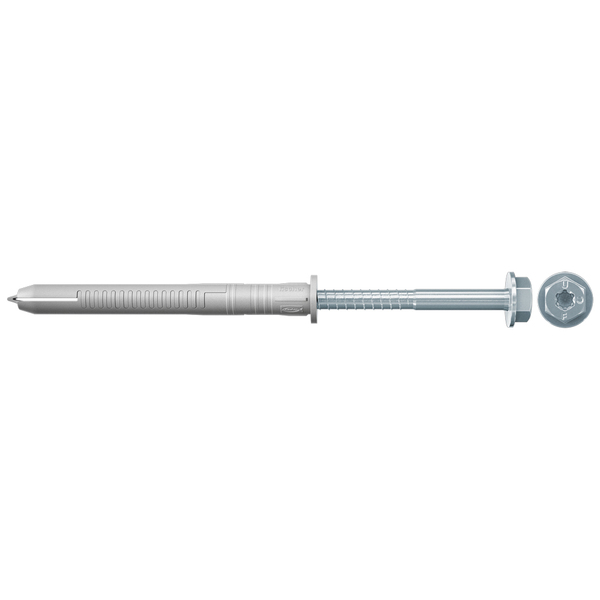FUR-FUS / Frame fixing - galvanized
| SKU: | |
| EAN: | |
| Prekės ženklas: | Fischer |
| Min. anchorage depth: | 70 mm |
The lamella plug with gentle power transfer
The fischer frame fixing FUR-FUS consists of a fixing sleeve made of high-quality nylon and a hexagonal screw and moulded washer made of zinc-plated steel. The FUR-FUS is set in the time-saving through-type installation. When driving in the screw, the teeth expand in the solid building material and against the drill hole wall. In hollow building materials, the teeth expand through the solid part of the block and form an undercut in the cavity. The fischer frame fixing is suitable for securely fixing metal constructions, gates, and doors in all building materials.
Top Features:
- It is particularly assembly-friendly even in narrower drill holes and wide attachments due to slimline plug geometry.
- ETA approval for multiple fixings in concrete and masonry.
- Secure fixing in all building materials: Lamella adapts to the surface.
- With hexagon screw and moulded washer for metal construction
Applications:
- Façade, ceiling and roof substructures made of wood and metal
- Windows
- Gates and doors
- Squared timbers
- Beams
- Wall covering
Building materials:
Approved for:
Concrete ≧ C12/15
Vertically perforated brick
Perforated sand-lime brick
Solid sand-lime brick
Solid brick made from lightweight concrete
Solid brick
Also suitable for:
Natural stone with dense structure
Solid panel made from gypsum
Hollow blocks made from lightweight concrete
Three-layer composite exterior wall panels
Lightweight aggregate concrete
Advantages:
- The operating principle with an anchorage depth of 70 mm and proven asymmetrical teeth, makes it an assembly-friendly anchor even in an unknown base material.
- The slim geometry guarantees a simple installation, even in cases involving thick wooden fixtures and narrow drill holes.
- Range available with diameters of 8 and 10 mm and usable lengths up to 160 mm.
Functioning:
- The FUR is suitable for push-through installation.
- Screwing in the screw causes the individual teeth to expand. In solid materials, the teeth create even expansion forces. In hollow materials, the teeth expand through the solid part of the block and form an undercut in the cavity.
- With vertically perforated bricks, only use rotary drilling (no impact drilling).
- Countersunk head screws are recommended for the installation of timber constructions; in the case of metal constructions, use anchors with hexagon head screws and moulded washers.

